5 Reasons Why You Have a Bloated Stomach
Years ago as a teenager, I would struggle regularly with a bloated stomach, gas and often times cramping. Years later, in my early 20’s, I experienced severe cramping, bloating and full blown irritable bowel syndrome. Fortunately, I was able to discover the root cause issues involved in my digestive struggles and corrected them naturally.
Unfortunately, so many people in our society today struggle with bloating. Some of the major triggers we can look at include poor diet, increased stress, exposure to toxins and medication usage. With so many triggers to a bloated stomach affecting us in our daily lives, it is easy to understand why so many people today struggle with bloating.
A bloated stomach can cause you distress and embarrassment. An abdomen full of gas and tension is hurtful to touch and can have you running urgently to the bathroom. However, stomach bloating can be a more serious problem than a simple reaction to the bowl of chili you ate 30 minutes ago. It can actually be a sign that your gut has an overgrowth of bacteria or yeast which may lead to a digestive disorder, allergies, autoimmune dysfunction and possibly cancer. (1)
Do You Experience A Bloated Stomach?
Stomach bloat results from accumulated gas within the digestive tract that causes the stomach to protrude forward. This can make the stomach tender and painful. You may recall someone joking that they appeared pregnant when they were experiencing bloating. Unlike fat, bloating is temporary and doesn’t cause the gaining of mass around the stomach. It is simply the result of air compacted around the abdomen.
People incorrectly assume that being bloated is just “water weight” or that it is caused from the storage of added fat mass around the abdomen. Fluid cannot buildup in the stomach but you may experience water retention in areas like your face, ankles or feet. Some conditions can cause both water retention and stomach bloating at the same time (4).
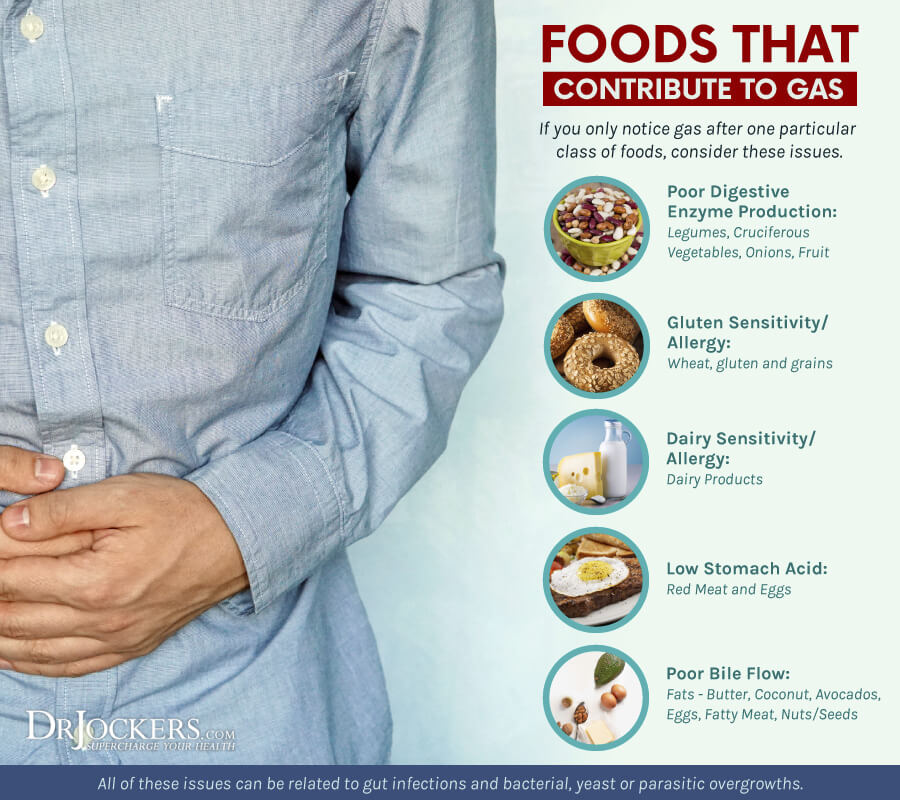
Main Causes of Stomach Bloating
Before you are able to relieve your stomach bloat you are probably questioning what causes the problem to begin with. Numerous reasons can trigger a bloated stomach from hormonal imbalances, thyroid dysfunction, allergies, gut dysfunction and many more. You will have a better understanding of what is triggering your symptoms by gathering information about the foods you eat and how your body feels after eating.
Simply put, any digestive problem can cause bloating. Narrowing down the culprit of what is affecting your gut health can be complicated as different factors affect the digestive tract differently such as creating metabolic disturbances or suppressing the body’s natural elimination processes (3). Associating factors such as sleep and stress can affect you at any time of day and may not initially be the major triggers on your radar.
Before you start to determine if your stomach bloating is the result of a serious health problem, consider the common causes for bloat in most people. The following intestinal disturbances commonly cause bloating:
- Impaired ability to metabolize sugar and carbohydrates. Some people may be lacking the presence of specific enzymes needed to completely digest complex sugars.
- Incomplete protein digestion. This is often due to low stomach acid and can cause food to ferment in the gut.
- Imbalanced gut microflora. Trillions of “good” and “bad” bacteria compete for room and board in the gut. When the unhealthy bacteria are higher in presence than the healthy bacteria, excessive gas can result from this imbalance causing stomach bloat.
Here are the 5 major causes of stomach bloating that I see on a regular basis.
1. Low Stomach Acid Levels:
A bloated stomach may be a telltale sign that the gut is experiencing mechanical problems or simply not functioning as it was designed. Hypochlorhydria, or the condition of low stomach acid, may be triggering your digestive upset. Low stomach acid (HCL) can shut down sphincter activity, reduce digestive motility and lead to an array of side effects like heartburn. Under these circumstances food remains in the stomach and is susceptible to bacterial fermentation.
Some bacteria are able to thrive in conditions of low acidity and metabolize the remnants of food, especially carbohydrates. This process results in GI upset including cramping, belching, acid reflux and bloating. Signs of low stomach acid may be accompanied by other symptoms including nausea, anemia, fatigue, food aversions, fowl body odor, and undigested food in stool (5). To learn how to improve the acid levels in your stomach, read my article here.
One of the major bacterial infections which you may be tested for is Helicobacter pylori. H. pylori is a bacterial infection that inhibits organs responsible for secreting stomach acid and produces toxins that induce oxidative damage, inflammation and carcinogenesis (7). This bacteria is believed to be present in the majority of the world’s population and is a major cause of gastric inflammation and stomach cancer (6).
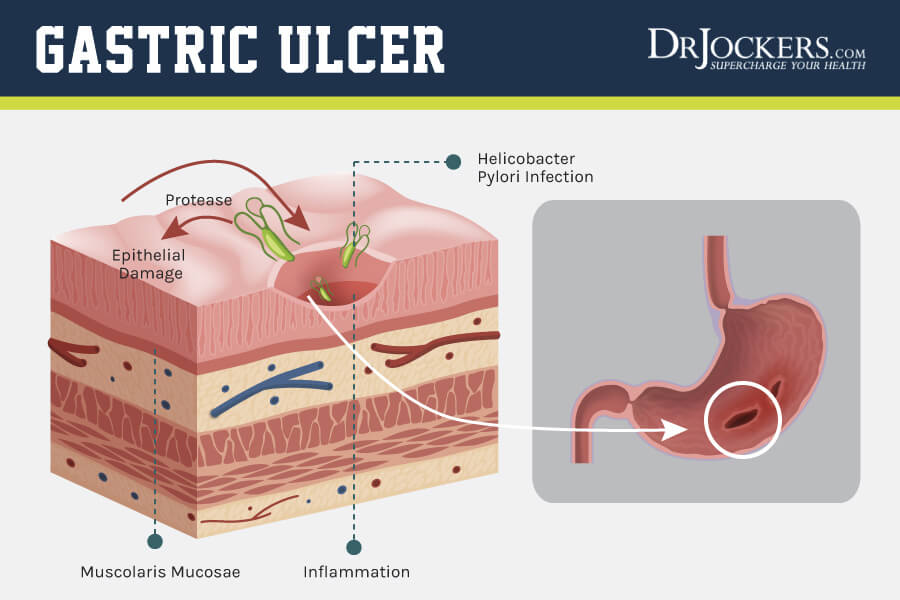
Slow Down and Reduce Stress:
Eating too quickly is another cause of low stomach acid levels and bloating. Food that is consumed without proper chewing aggravates the digestive process. In circumstances of low stomach acid, the gallbladder and other organs cannot secrete adequate enzymes to metabolize food in the small intestines. This can further result in the accumulation of bacteria in the small intestine that have been introduced with food and have not been broken down from acid.
Similarly, stress depletes stomach acid. When a perceived threat is detected, the body innately is designed to shut down non-essential processes to conserve energy. Remaining in a state of chronic stress, especially during and after a meal, can indirectly shut down digestion.
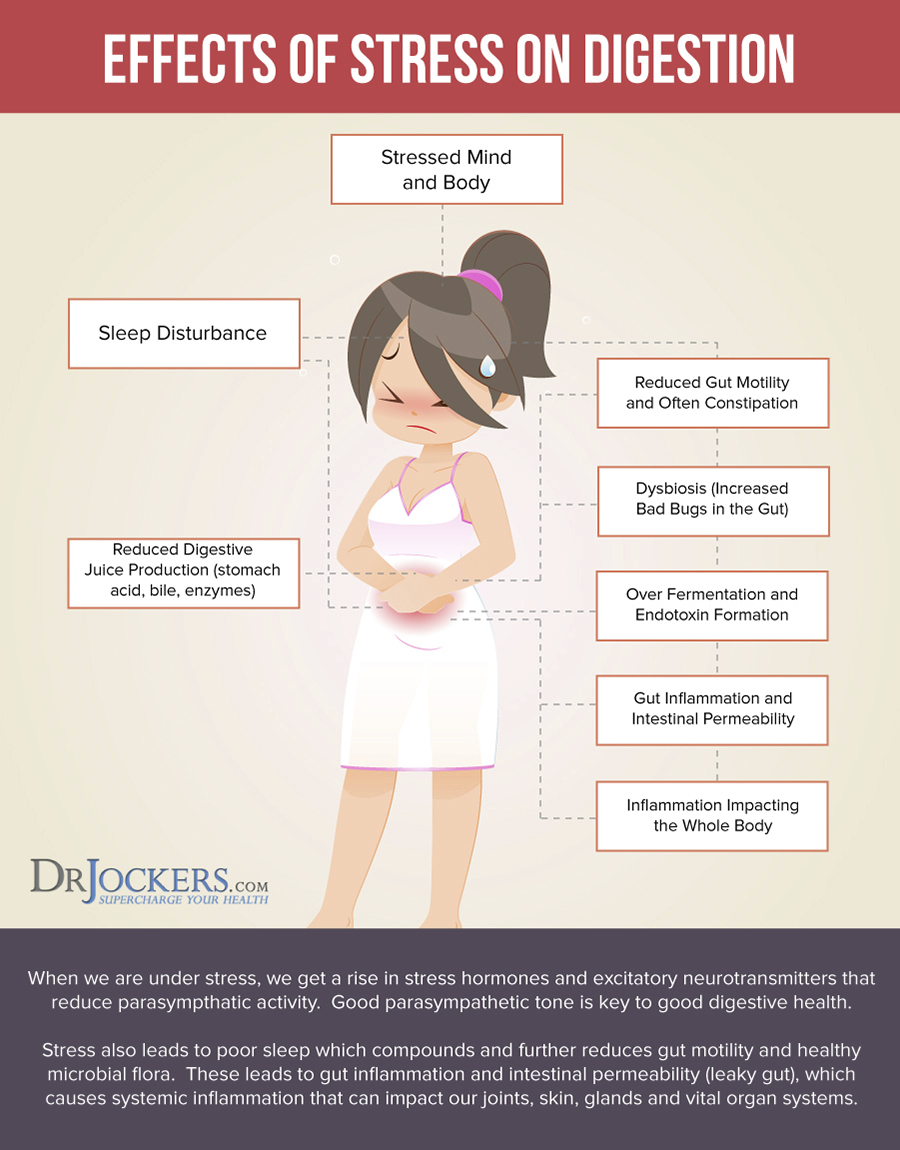
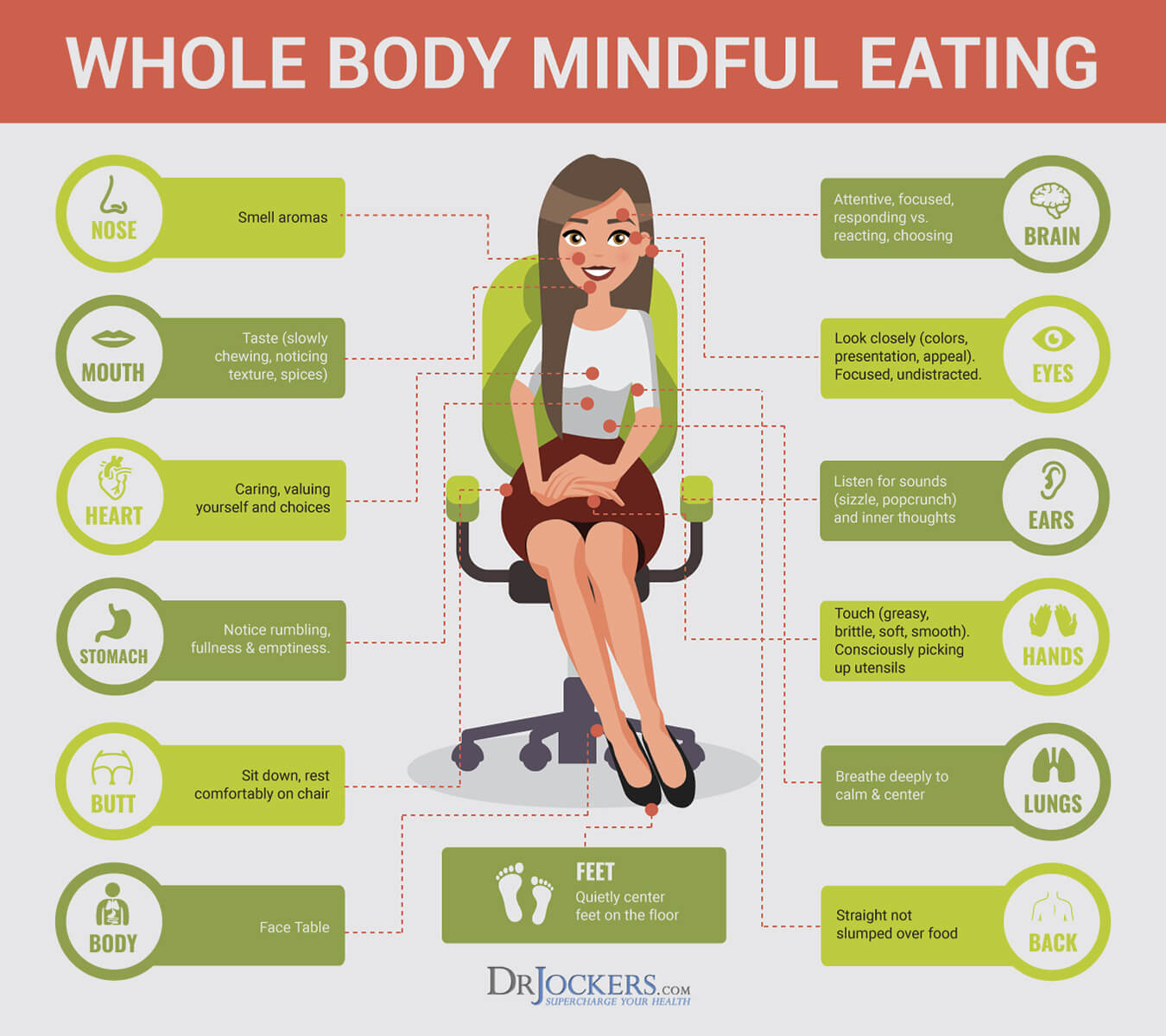 2. Poor Gallbladder Function
2. Poor Gallbladder Function
Enzymes released by the gallbladder are vital for optimal digestion of fat. When fatty foods pass through the small intestine, the gallbladder secretes bile to emulsify dietary fats and create fatty acids for easy absorption into the body. The gallbladder is essential to digest fats and vitamins which require a fat for increased bioavailability such as vitamin A, D, E, and K. It is also responsible for blood sugar metabolism and aids in the excretion of toxins out of the body (8). (9, 10)
When your gallbladder is malfunctioning you may experience intestinal upset including nausea, gas and bloating that is especially prevalent after a meal high in fat. Serious conditions can also be partly to blame for a slow liver and poor gallbladder function including fibromyalgia and hypothyroidism. To determine if your gallbladder is to blame for your stomach bloat, check to see if any of the following symptoms occur.
- Headaches and migraines
- Evidence of bacterial or parasitic overgrowth in the small intestines
- Pain in feet or the iliotibial (IT) band
- Chronic pain in the right shoulder or near the right shoulder blade
- Rectal itching and fatty or light colored stool
- Constipation or diarrhea
- Problems losing weight
- Heightened sensitivity to chemicals resulting in allergic reactions
- Blistering, peeling or itching of skin referred to as pruritis
- Persistent runny nose
- A bitter after taste in the mouth following eating
- Yellowing skin
- Pain in right rib cage accompanied by fever
- Signs of fat soluble vitamin deficiencies including dry skin and brittle hair
- Loss of appetite
- Hormonal imbalances leading to abnormal sexual function
These serious health problems can be limited if not avoided using natural healing strategies. Improving gallbladder health can be as simple as stimulating gallbladder function with bitter herbs like cilantro, turmeric, milk thistle and parsley. Consuming an anti-inflammatory diet high in medium chain triglycerides (MCTs) is also key.
Such fats found in coconut oil, avocados and grass-fed butter are easier to digest, a good source of energy and provide hormone and immune support. Learn 25 ways to improve your gallbladder health by reading this article. We have also developed a specific product to support good bile flow here
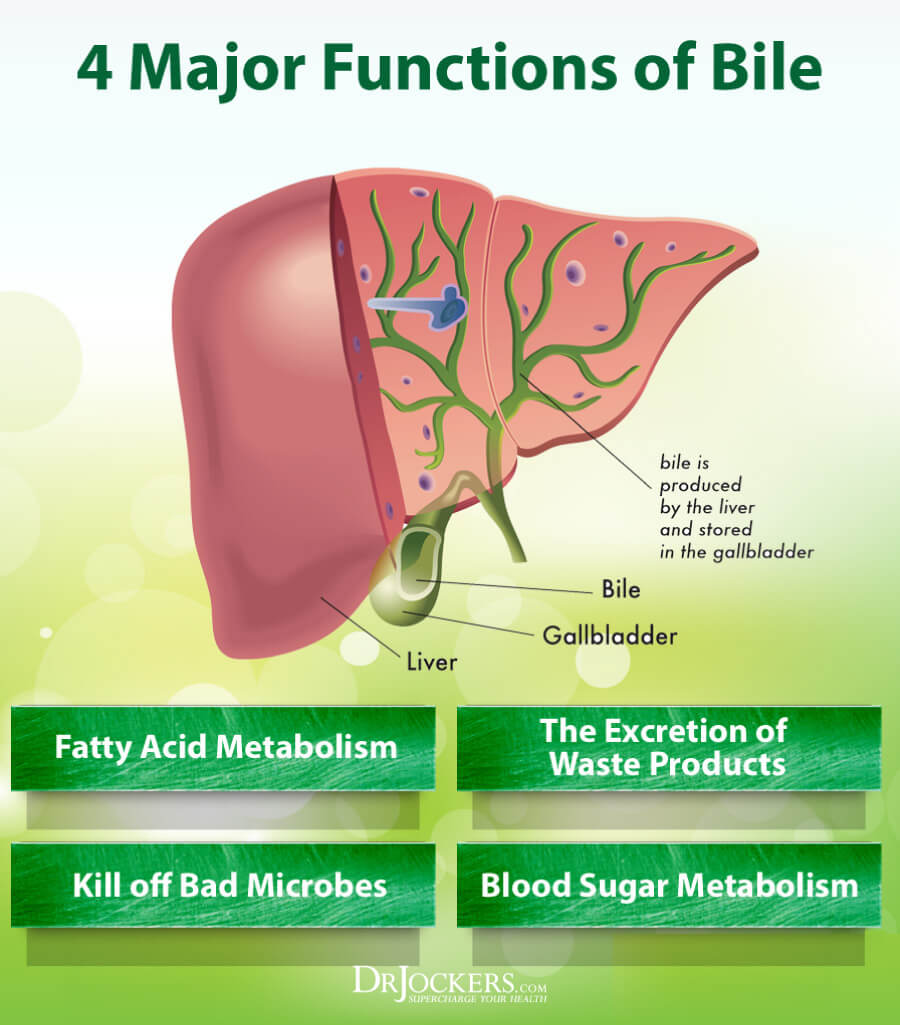
 3. Small Intestinal Bacterial Overgrowth
3. Small Intestinal Bacterial Overgrowth
Both beneficial and harmful bacteria overgrowth in the small intestine can result in intestinal damage. The disorder known as SIBO (small intestinal bacterial overgrowth) can result in leaky gut syndrome, systemic inflammation and heightened sensitivities or allergies to food.
50% of patients with liver cirrhosis and celiac disease and 90% of elderly patients with lactose malabsorption have been shown to be affected by SIBO. If you are experiencing the symptom of a bloated stomach with SIBO you may also be at an increased risk for a more severe health problem. (11)
The presence of excess microorganisms in the small intestines produce methane gas and sulfur resulting in bloating and a variety of other digestive disturbances such as food intolerance, diarrhea, cramping and fat malabsorption (12). These complications may manifest as autoimmune diseases, diabetes, irritable bowel syndrome or disease, chronic fatigue syndrome, neuromuscular disorders and deficiencies in vitamin B12 and minerals such as iron and magnesium.
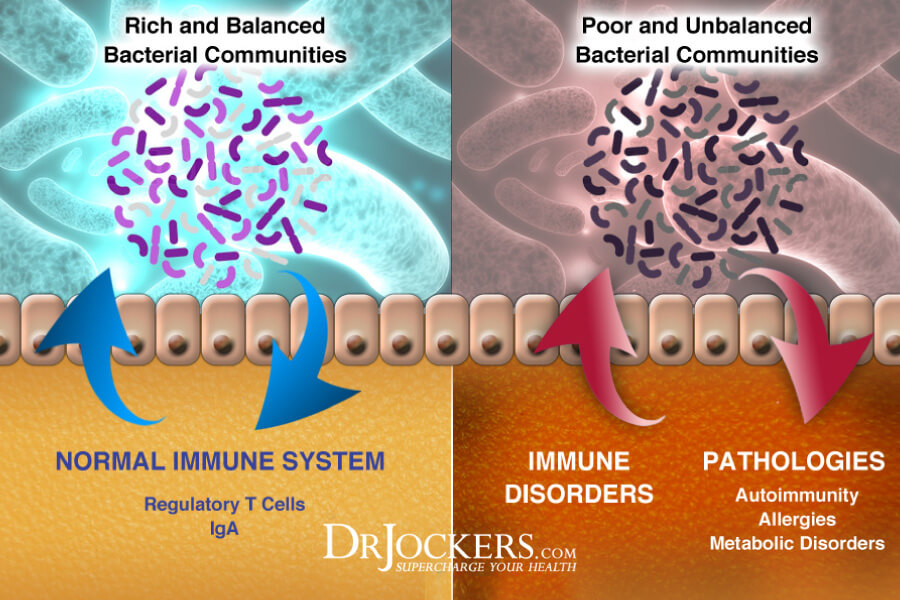
Developing a Bacterial Overgrowth:
A variety of factors can disrupt gut microflora creating this imbalance of bacterial growth. If you have taken antibiotics, steroids or acid-blocking drugs (PPIs) you have an increased risk of developing SIBO (13). You may also be more susceptible to bacterial imbalance if you have damage or obstruction to the gut such as scarring or diverticula (14).
Individuals with SIBO are advised to test for FODMAP (Fermentable Oligo, Di- and Monosaccharides and Polyols) sensitivity. Glucose, fructose, polyols and lactose are examples of sugars found in foods which can be problematic for digestion. Following a low FODMAPs diet plan rich in plant based proteins, pastured eggs, wild salmon, coconut or olive oil and high quality herbs, fruits and vegetables can minimize health problems related to SIBO within 1 week on the diet. (15)
Learn how to test to see if you have SIBO and beat it naturally by reading more information on the topic here.
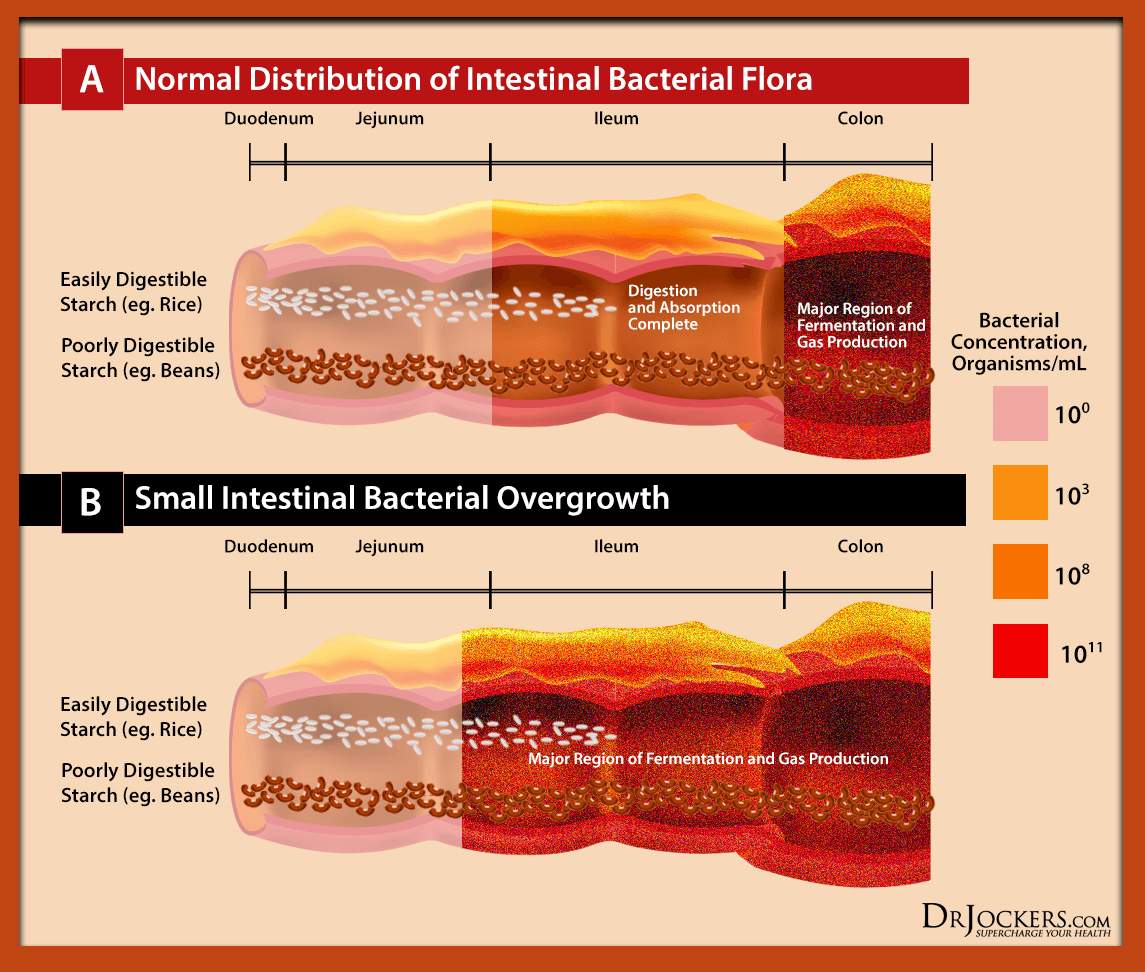
4. Candida Overgrowth
If your bloated stomach occurs in combination with mood swings, cognitive impairment, sugar cravings, fatigue or many other common problems, your bloat may be a symptom of Candida overgrowth. Candida Albicans is a type of yeast that naturally inhabits the gut flora with other microbes. Normally a healthy and needed component of the human body, certain factors can increase Candida concentration in the mouth, throat, intestinal tract and genitals. (17)
When Candida proliferates well enough that it reaches the blood stream it can secrete more than 70 various toxins into the entire body (16). As a result this may cause liver dysfunction, heightened immune response, and possibly cancer growth. Common symptoms to warn of Candida overgrowth may include the following:
- Athlete’s foot or toenail fungus
- Skin rashes, hives, eczema or psoriasis
- Mood imbalances, irritability, depression and anxiety
- Rectal or vaginal itching, UTIs and vaginal infections
- Memory disturbances such as brain fog or ADHD
- Autoimmune diseases including Crohn’s Disease, Scleroderma, Lupus, Rheumatoid arthritis for example
- Seasonal allergies
- Low energy and abnormal feeling
- White lesions on the tongue or inner cheeks
To overcome Candida it is first necessary to control the Candida population and then restore the gut lining. Bitter herbs are excellent to support the gallbladder because they aid in the detoxification of the liver.
Healthy detoxification pathways are critical to remove accumulated toxins and boost the immune system which has been fighting overtime to defend against Candida overgrowth. Foods that contain anti-fungal and antioxidant properties such as coconut oil and green tea improve Candida levels and provide anti-inflammatory benefits.
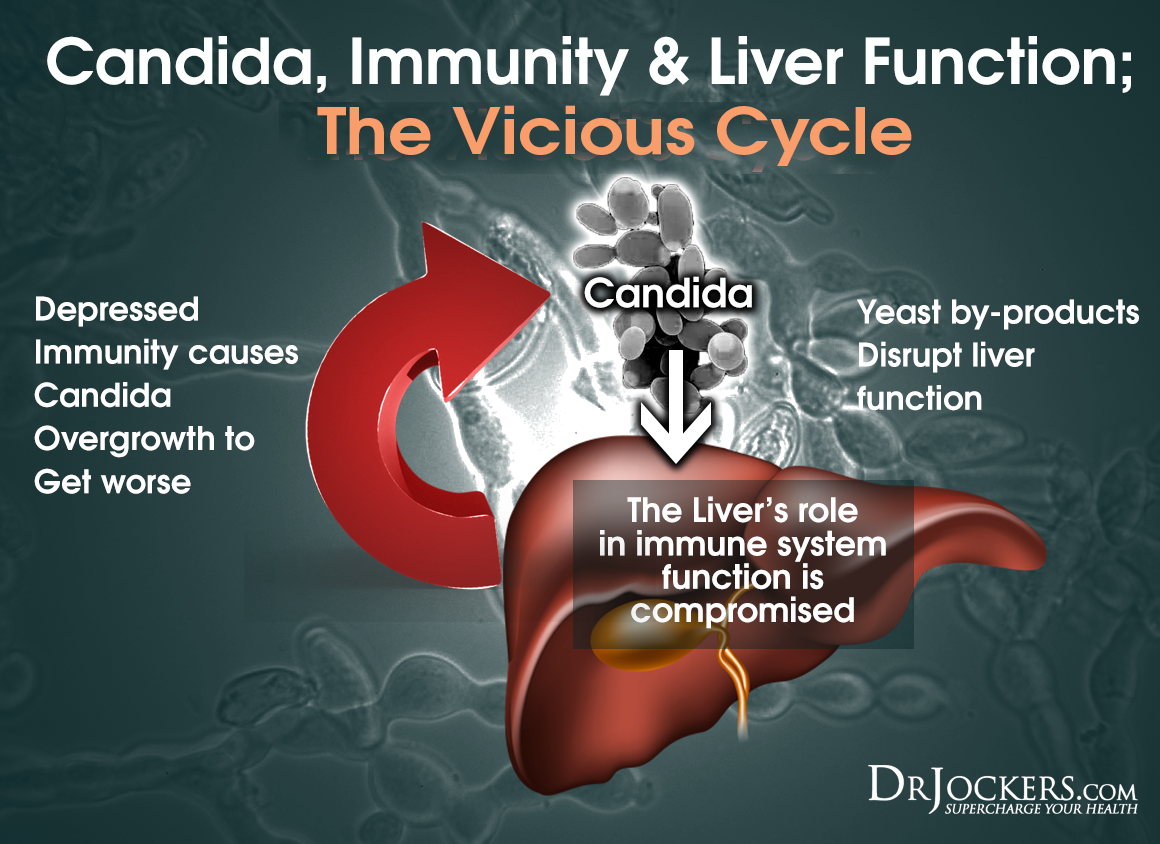
5. Food Sensitivities
Abdominal bloating may be one of the first signs that you notice resulting from food sensitivity or intolerance. There is a plethora of symptoms associated with food sensitivities that are often unique in each individual. Journaling about your food consumption while practicing an elimination diet may be one of the best processes you can follow to determine what food sensitivities you have.
The major food allergens include dairy, wheat, corn, eggs, gluten, soy, shellfish, and peanuts. Given that 70% of the immune system is compromised in the digestive tract, eating these foods can contribute to inflammation in the gut and other autoimmune responses such as skin rashes, weakened immunity and autoimmune disease (18).
Inflammatory foods promote an imbalance of microorganisms like Candida and can trigger leaky gut syndrome. As particles from these foods leaks through the gut, the immune system must react to the allergen as it enters the circulatory system. This disturbance, also known as gut dysbiosis, can lead to metabolic complications such as obesity and insulin resistance (19).
Don’t go your whole life assuming that your discomfort following the consumption of certain foods is normal. Learn which foods are causing you digestive upset by following these 5 easy steps to an elimination diet here and eliminate the cause of a bloated stomach.
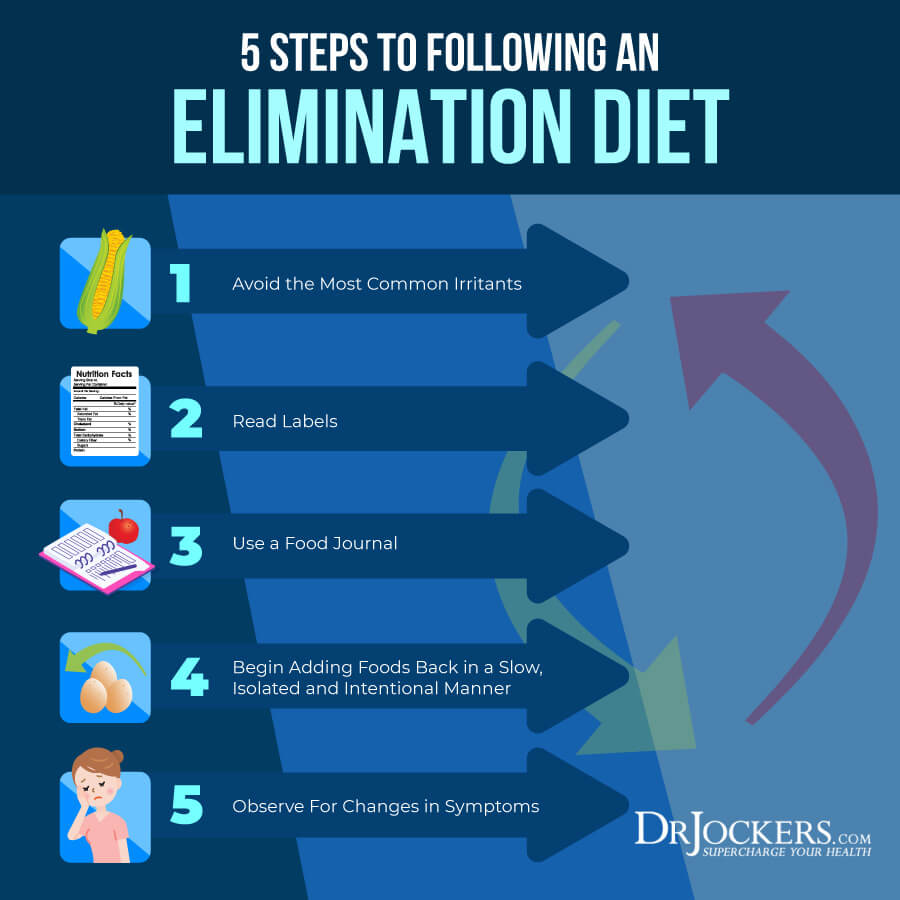
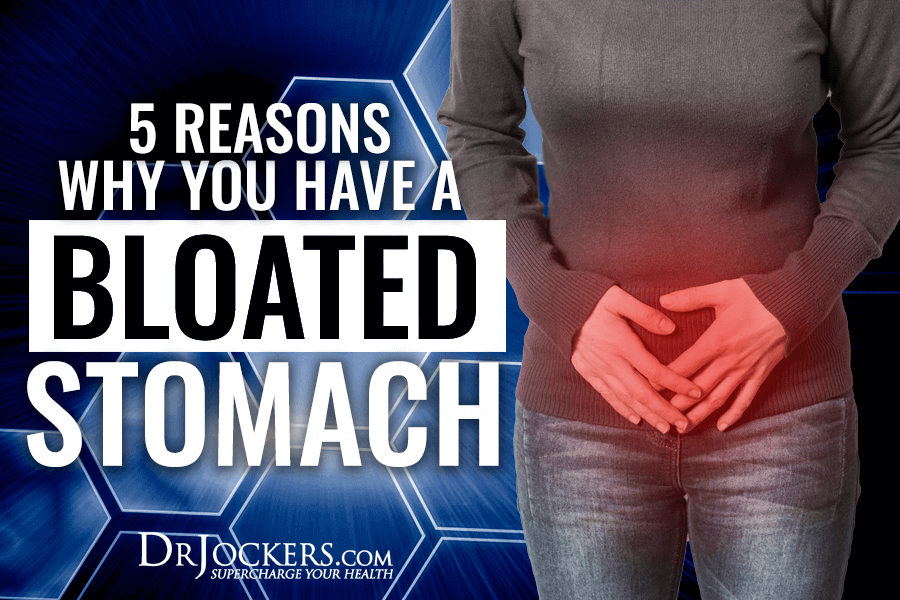
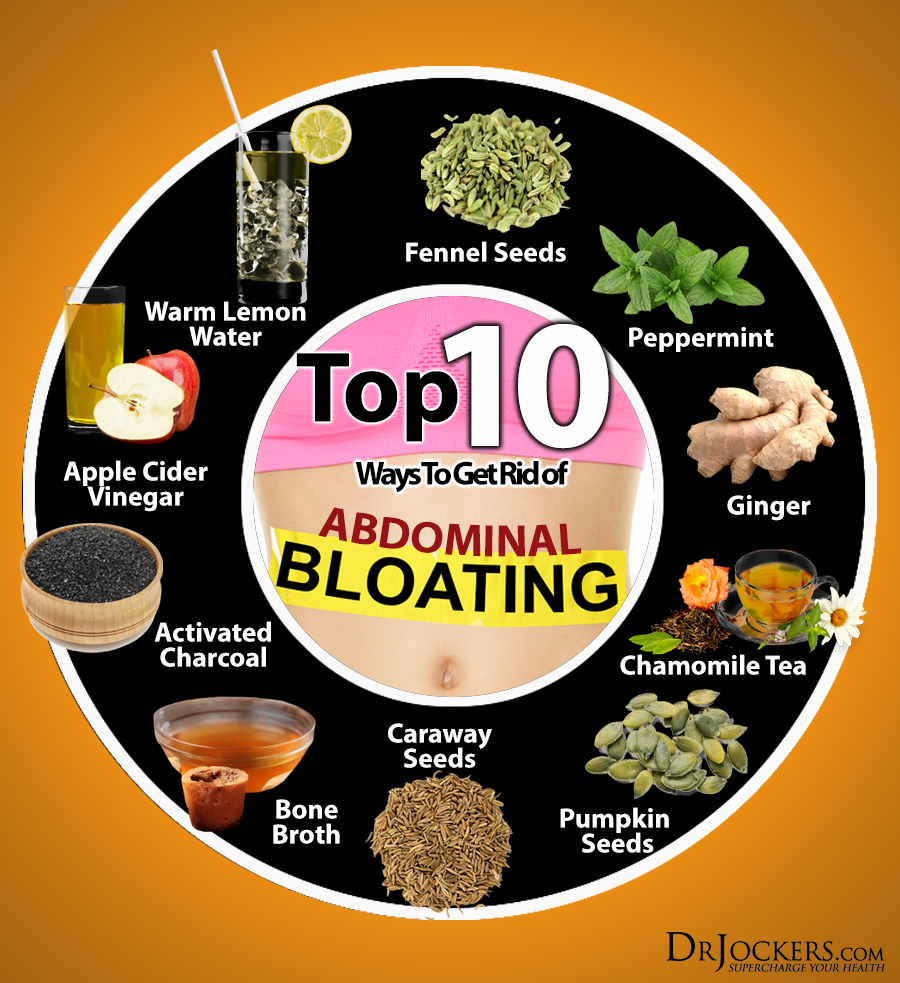
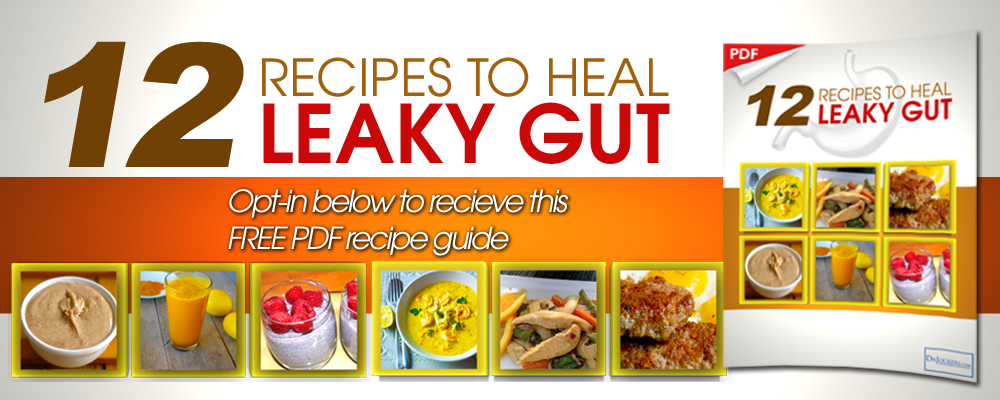


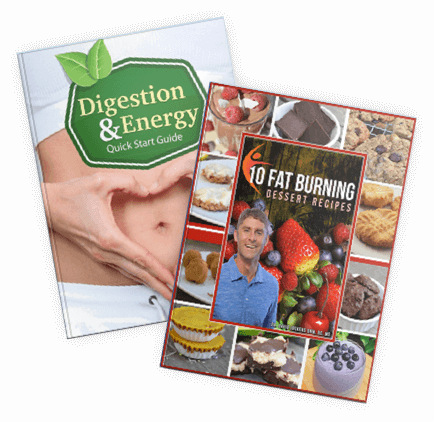

I have enjoyed reading your article about common reasons for bloating, especially the malfunctioning gallbladder. But I wonder what a person needs to do when they no longer have a gallbladder? If I knew this information 10 yrs ago I probably would have tried things prior to having it removed but I am basically getting the symptoms that you describe, yet can’t “help” my gallbladder since I don’t have one. What do you recommend?
Supplementing with an HCL/OX Bile supplement would be a great first step, then taking steps to support your liver health will be a good idea! Here’s a helpful article Laurel: https://drjockers.com/bile-liver-gallbladder/
Dr Jockers,
Do you see patients that have every digestive disease aka candida, disbiosis,Sibo, etc! I’ve been suffering for 10 years and I need real help. I would love your help!!
Hi Melinda, I am so sorry to hear that you have been suffering. Yes, our team has amazing nutritional coaches that help individuals restore their gastrointestinal health. I suggest following the recommendations in this article: https://drjockers.com/functional-nutrition-tips-to-find-a-great-health-coach/